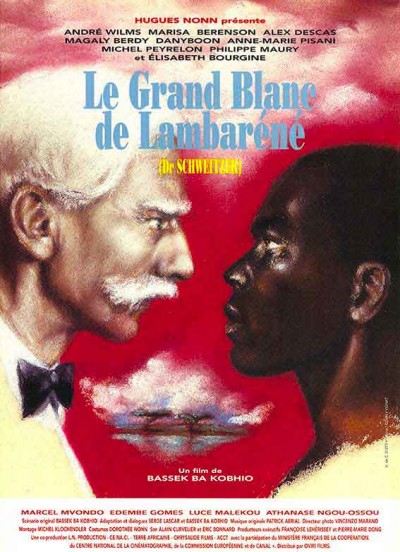Le Grand Blanc de Lamberéné
Doctor Schweitzer
De/by Bassek Ba Kobhio.
Auteurs/authors: Bassek Ba Kobhio et Serge Lascar.
Musique/music: Patrick Abrial.
Avec/with André Wilms, Marisa Berenson, Alex Descas, Magaly Berdy, Dany Boon, Elisabeth Bourgine.
1995 – Couleur/Color – 94’ HD
Production : France.
Synopsis
Enfant de Lambaréné (Gabon), le jeune Koumba grandit aux sons des orgues du Docteur Schweitzer. II admire plus le médecin que le musicien, et il se promet de devenir comme le « Grand Blanc », un docteur.
La seconde guerre mondiale prive le village-hopital de médicaments. Pour soulager les souffrances de ses malades, Schweitzer accepte de rencontrer un sorcier (N`Ganga) pour utiliser la pharmacopée africaine.
Quand la paix est enfin rétablie, les pirogues chargées de médicaments ramèment aussi les jeunes combattants du village partis se battre aux cotés des français. L’un d’entre eux Mikendi, en revient le coeur meurtri et plein de ressentiment.
Le monde de Koumba bascule le jour ou Lambi son père se fera gifler par le Docteur Schweitzer. La douceur, I’amour de Mme Hélène Schweitzer pour les habitants de Lambaréné n’empechera pas la naissance d’une révolte.
Afin de supplanter le Docteur Schweitzer, Mikendi pousse les habitants du village a financer les études de Koumba en France.
Tandis que Koumba étudie sa médecine et son droit, Albert Schweitzer devient célèbre en Amérique, puis en Europe et au Japon. Hélène, tuberculeuse, nest plus la. Bissa, de la tribu des Galwa, Marie-Madeleine, noire, veille stir le Grand Blanc.
L’orgue envoie toujours vers la forêt et les étoiles ses sonates de Bach quand Koumba décide de rentrer à Lambaréné. Le Gabon a choisi son indépendance ; Koumba entre en politique. II est élu député. Dès lors il ne cesse de s’opposer l’homme qu’il vénérait étant enfant, le Grand Blanc de Lambaréné. Sentant sa fin prochaine Schweitzer, décide d’être enterré a Lambaréné. II sait qu’en Afrique, il est une tradition qui veut que l’on se fasse inhumer à I’endroit où l’on est né, ou bien sur les lieux on l’on aurait aimé naître. Ses dernières volontés seront respectées a la lettre, au grand trouble de Koumba.
Note d’intention
Ce film est un regard noir, ce n’est pas un film de revanche, il est un témoignage. Et ce témoignage va beaucoup plus loin que l’histoire personnelle de Schweitzer. La résurgence actuelle de théories en faveur d une recolonisation de l’Afrique, la mode humanitaire, la « tragédie » économique sociale et politique actuelle du continent incitent les africains prendre rigoureusement la parole et agir »
Synopsis
Young Koumba, a child of Lanlbarn (Gabon), grows up to the sound of Doctor Schweitzers’ organ music. Admiring Schweitzer’s medical skills more than his music, he resolves to become a doctor like the « Great White Man ».
The Second World War deprives the hospital-village of drugs. To relieve his patients’ suffering, Schweitzer agrees to meet a witch-doctor (N’Ganga) who can provide access to the African pharmacopoeia.
When peace finally comes, the canoes loaded with medicine also bring home young men who had left the village to fight with the French. One of them, Mikendi, is twisted by his experiences and filled with resentment. Koumba’s world is shaken on the
day that the doctor slaps his father, Lambi. The gentleness of Schweitzers’ wife and her love for the people of Lambaréné are not enough to prevent the seeds of revolt from being sown. Mikendi urges the inhabitants of the vllage to pay for Koumba to study in France so that he can subsequently supplant Schweitzer.
While Koumba studies medicine and law, Albert Schweitzer’s fame spreads through America, Europe and Japan.
HéIène, who suffers from tuberculosis, has now left. Bissa of the Galwa tribe, a black Mary Magdalene, watches over the Great White Man. The forest still echoes to his Bach sonatas when Koumba decides to return to Lambaréné.
Gabon has chosen independence. Koumba goes into politics and is elected to parliament as deputy. From this point on, he is in constant conflict with the figure he revered as a child, the Great White Man of Lambaréné.
Sensing imminent death, Schweitzer decides to be buried in Lambaréné. He knows that Africans get traditionally buried either in their birthplace or in the place where they would have liked to be born. To Koumba’s discomfiture, Schweitzer’s last wishes will be obeyed to the letter.
Explanatory note
The film takes a Black viewpoint. It is not an act of vengeance, but a testimony – a testimony which goes much further than simply relating Schweitzer’s personal story The current resurgence of theories suggesting the recolonization of Africa; the humanitarian aid trend; « the continent’s present economic, social and political tragedy: all incite Africans to speak out clearly and to act. »

